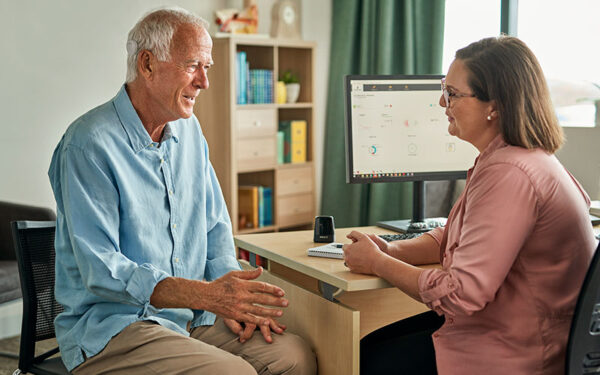You play a pivotal role in helping your loved one navigate their hearing loss journey. Being a support person can mean anything from encouragement and guidance to research and preparation. Discover what to expect and how to make the most of your loved one’s upcoming hearing appointment so you can both leave feeling informed and confident.
Experiencing hearing loss and navigating solutions is often an emotional—and overwhelming—process. As a loved one looking for ways to offer support, a reassuring and calm presence is vital in helping those with hearing loss seek help quickly and select the best solution for them.
After all, family and friends truly understand the profound effect hearing loss has on daily routines and lifestyles—from missing important conversations to retreating from social interactions and beloved activities. With the right hearing solution, your loved one may regain access to clearer sound and reconnect to the life they loved.
 If you’re supporting someone through their journey toward a hearing loss solution, your positivity and insight is invaluable. Acting as a sounding board, sharing your perspective and gathering information can help your loved one feel empowered as they make a life-changing decision.
If you’re supporting someone through their journey toward a hearing loss solution, your positivity and insight is invaluable. Acting as a sounding board, sharing your perspective and gathering information can help your loved one feel empowered as they make a life-changing decision.
Visiting an audiologist is the first positive step toward understanding the available hearing loss solutions and identifying which option is best for your loved one. Preparing for the appointment is key to understanding what will happen and what the results mean, so you both leave feeling confident about the journey ahead. Find out what to expect, how to prepare and which questions to ask at your loved one’s upcoming hearing appointment:
What to expect
Knowing what to expect at the first appointment will allow you to get the most out of the visit.
- Creating a case history: The audiologist will ask questions about your loved one’s medical history, recent hearing loss symptoms and general physical health.
- Performing a physical exam: To check for infection, earwax build up or debris, the audiologist will examine using a otoscope.
- Testing hearing: To determine the type and degree of hearing loss, the audiologist will perform a number of simple tests.
- Reviewing results: The results of the hearing tests are mapped onto a chart called an audiogram, which gives a visual overview of hearing loss.
- Discussing treatment options: After reviewing results, the audiologist will recommend treatment options for your loved one.
How to prepare
Preparing for the audiologist appointment can help you both make the most of the visit and ensure that all of your hearing health concerns are addressed.
- Identify priorities: Before the appointment, think about what your loved one’s hearing priorities are and their desired lifestyle. Be sure to consider their current and future life stages, such as school, work and retirement. Does their job require a lot of face-to-face conversation or phone work? Do they enjoy frequent traveling or outdoor activities?
- Gather medical history: Sharing general medical history will help determine if your loved one has any underlying health issues that could be affecting their hearing, and provide a holistic understanding of their overall health. Have a list ready of current medications, long-term health conditions and any family history of hearing loss.
- Arrive early and calm: Your loved one may feel nervous or overwhelmed by taking their first step toward a hearing loss solution. Arrive early to avoid feeling rushed and allow enough time to fill out any paperwork to help you both feel more focused and calm for the appointment.
- Take notes: A lot of information will be shared throughout the appointment. Help your loved one stay present by jotting down key information about their hearing health, available solutions, resources to consider and any possible follow-up steps that they can reference as they move through their hearing solution journey.
Questions to ask
It’s crucial that your loved one asks all the questions that they need to during the appointment so they gain a clear understanding of their type of hearing loss and the available solutions that might be right for them. Help your loved one understand the impact of cochlear implants by asking their audiologist the following follow-up questions:
- Which hearing solutions are available?
- Are hearing solutions covered by insurance?
- What are the benefits of implantable hearing solutions over hearing aids? How does it work?
- How will it look? (Is it behind-the-ear or off-the-ear?)
- How will this solution fit into [my loved one’s] lifestyle? (i.e. listening to music, talking on the phone, traveling, exploring the outdoors, swimming in the pool or socializing at a noisy restaurant.)
- Can an implantable hearing solution provide a hands-free streaming experience?
- How long will an implantable hearing solution last? How reliable are they?
- Is it possible to speak with someone who has an implantable hearing solution?
- What happens during the implant surgery? Can both ears be implanted during the same surgery?
- How long is recovery? What does the recovery process look like?
- What happens when the implant is turned on?
- How will hearing implants help with speech? Do you have recommendations for hearing therapy?
- Are there opportunities to upgrade as technology changes?
Continued support
While visiting an audiologist is an important step in finding the best hearing solution for your loved one, the selection process might take time. It’s a life-changing decision that requires careful consideration. Practice patience, continue to check in and be there for your loved one so they can feel confident with their choice when they are ready to make it.
Cochlear Americas has more information for you and your loved one on our website. Find more hearing resources here.
